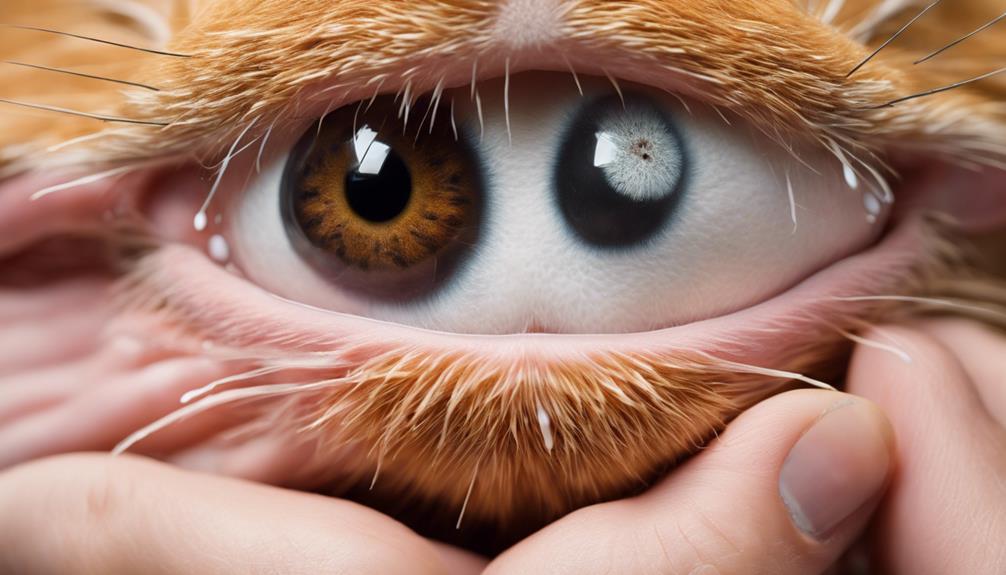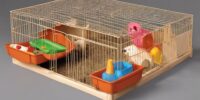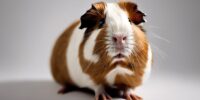How to Identify and Treat Guinea Pig Eye Infections

Guinea pigs are prone to eye infections, which can be caused by bacteria, viruses, or injuries. Symptoms of an eye infection in a guinea pig may include discharge, squinting, redness, or swelling around the eye. If you suspect your guinea pig has an eye infection, it is important to seek veterinary care promptly.
Treatment for a guinea pig eye infection typically involves antibiotic eye drops or ointment prescribed by a vet. It is crucial to follow the veterinarian's instructions carefully to ensure the infection is properly treated. In some cases, additional supportive care such as cleaning the eye with saline solution may be recommended to aid in the healing process. Regular monitoring of the eye infection and follow-up visits with the vet are essential to ensure the guinea pig's eye health is improving.
Key Takeaways
- Early detection is crucial for treating guinea pig eye infections effectively.
- Consult a veterinarian for accurate diagnosis and tailored treatment plans.
- Maintain a clean living space and provide proper nutrition to prevent eye issues.
- Monitor recovery progress closely and follow vet recommendations for optimal eye health.
Recognizing Common Symptoms
Recognizing common symptoms of a guinea pig eye infection is important for timely and effective treatment. When observing your guinea pig, keep an eye out for signs such as redness, swelling, discharge, or excessive tearing. These symptoms may indicate an underlying infection that requires prompt attention. If you notice any of these signs, it's essential to consult a veterinarian for proper diagnosis and treatment options.
Infection prevention is key to keeping your guinea pig healthy. To reduce the risk of eye infections, make sure their living space is clean and free of irritants. Regularly clean their cage, provide fresh bedding, and avoid exposing them to dusty environments. Additionally, pay attention to their diet and make sure they're receiving a balanced nutrition to support their immune system.
Care tips such as gentle cleaning with a damp cloth can help alleviate mild symptoms and prevent further complications. Remember, early detection and intervention are important in managing guinea pig eye infections effectively. By staying vigilant and proactive, you can make sure your furry friend stays happy and healthy.
Proper Handling and Examination
To guarantee proper care for your guinea pig's eye health, skillful handling and thorough examination techniques are indispensable. When examining your guinea pig's eyes, it is essential to approach with gentleness and patience. Here are some essential handling techniques and tips for a successful eye examination:
| Handling Techniques | Examination Tips |
|---|---|
| 1. Approach calmly | 1. Use a dim light |
| 2. Support the body | 2. Check for redness |
| 3. Use a soft grip | 3. Look for discharge |
| 4. Minimize stress | 4. Assess for swelling |
| 5. Reward with treats | 5. Monitor for blinking |
Understanding Potential Causes

Understanding the potential causes of guinea pig eye infections can greatly assist in identifying and treating these conditions effectively. Infection prevention is vital in maintaining the well-being of these small pets. Factors such as poor hygiene, crowded living conditions, or exposure to other sick animals can contribute to the development of eye infections in guinea pigs. Ensuring a clean environment, regular cage cleaning, and proper handling can greatly reduce the risk of infections.
Environmental factors also play a substantial role in the occurrence of eye infections in guinea pigs. Dust, allergens, or irritants in the surroundings can irritate the eyes and lead to infections. It's essential to provide a clean and dust-free environment for guinea pigs to minimize the chances of eye issues.
Consulting a Veterinarian
When faced with a guinea pig eye infection, seeking the expertise of a veterinarian is essential.
A professional diagnosis from a vet is recommended to accurately identify the issue.
This consultation is vital for discussing a tailored treatment plan for the well-being of your guinea pig.
Veterinarian Expertise Crucial
Seeking the guidance of a veterinarian is essential when addressing Guinea pig eye infections. Veterinarians have the expertise to provide proper diagnosis and treatment for your pet's eye condition. Here are some reasons why consulting a veterinarian is vital in dealing with Guinea pig eye infections:
- Specialized Knowledge: Veterinarians have specialized training in diagnosing and treating eye infections in Guinea pigs.
- Access to Medications: Veterinarians can prescribe appropriate medications to help treat the infection effectively.
- Prevention of Complications: Veterinarians can help prevent the infection from worsening or causing further complications.
- Follow-up Care: Veterinarians can provide guidance on how to care for your Guinea pig's eyes post-treatment to make sure a full recovery.
Professional Diagnosis Recommended
For a thorough assessment and accurate treatment plan, consulting a veterinarian is strongly advised when addressing Guinea pig eye infections. While it may be tempting to attempt self-diagnosis or home treatment, the delicate nature of a Guinea pig's eyes requires professional expertise.
A veterinarian will be able to conduct a detailed examination to determine the underlying cause of the eye infection and recommend the most effective treatment. Additionally, they can provide guidance on proper care techniques and preventative measures to make sure the well-being of your pet.
Treatment Plan Discussion
To guarantee the best possible care for your Guinea pig's eye infection, scheduling a consultation with a veterinarian is the most important course of action. Once you've consulted a professional, here are some key points to think about for the treatment plan:
- Medication Administration: Your veterinarian will prescribe the appropriate eye drops or ointments for your Guinea pig's specific condition. Follow the instructions carefully to make sure the medication is administered correctly.
- Follow-up Care: Regular follow-up appointments are essential to monitor your pet's progress and make any necessary adjustments to the treatment plan.
- Ask Questions: Don't hesitate to ask your veterinarian any questions you may have about the treatment plan or your Guinea pig's eye infection.
- Observe Closely: Keep a close eye on your pet's behavior and the condition of their eyes to track improvements or any potential setbacks.
Administering Eye Drops
Administering eye drops to your guinea pig requires a gentle touch and precision to guarantee effective treatment of eye infections. When applying medication, proper technique is critical to make sure the well-being of your furry companion. Here are some steps to help you administer eye drops to your guinea pig:
| Steps | Instructions |
|---|---|
| Step 1 | Wash your hands thoroughly to avoid contamination. |
| Step 2 | Gently restrain your guinea pig to prevent sudden movements. |
| Step 3 | Hold the eye drop bottle with one hand and use the other to hold your guinea pig's head steady. |
| Step 4 | Administer the prescribed number of drops directly into the eye while avoiding contact with the dropper tip. |
Implementing Preventative Measures

After ensuring the proper administration of eye drops to your guinea pig, it's wise to contemplate implementing preventative measures to safeguard their ocular health. Preventative measures play an important role in maintaining the well-being of your furry companion.
Here are some key steps to contemplate:
- Hygiene Practices: Regularly clean your guinea pig's living area, including their bedding and any items they come into contact with, to prevent the spread of infections. Additionally, make sure that your guinea pig's eyes are kept clean and free from any discharge or debris.
- Dietary Requirements: Provide a balanced diet rich in vitamin C and beta-carotene to support your guinea pig's overall health, including their eye health. Fresh vegetables and high-quality hay should be staples in their diet to promote good eyesight.
- Regular Vet Check-ups: Schedule routine check-ups with a knowledgeable veterinarian to monitor your guinea pig's eye health and address any potential issues promptly.
- Avoid Stress: Guinea pigs are sensitive animals, so create a peaceful environment with minimal stressors to help maintain their overall health, including their eye health.
Providing a Comfortable Environment
Ensuring a cozy and inviting environment for your guinea pig is essential in promoting their overall well-being, including their eye health. Creating a stress-free environment is key to helping your furry friend feel safe and secure. Provide proper bedding such as hay or paper-based materials to keep them comfortable and dry. Guinea pigs are sensitive to their surroundings, so keeping their living space clean and well-maintained is vital for their health and happiness.
In addition to suitable bedding, make sure your guinea pig has enough space to move around freely in their enclosure. Providing hiding spots and enrichment activities can help reduce stress and encourage natural behaviors. Natural light and fresh air are also important for their well-being, so place their habitat in a well-lit area with good ventilation.
Monitoring Recovery Progress
To support your guinea pig's recovery from an eye infection, attentively observe their progress and response to treatment. Monitoring recovery progress is vital in ensuring your furry friend's well-being. Here are some essential steps to help you track their improvement:
- Establish a Recovery Timeline: Work with your veterinarian to set realistic expectations for your guinea pig's recovery. Understand that healing takes time and varies for each individual.
- Track Progress Regularly: Keep a journal to monitor changes in your guinea pig's eye condition. Note any improvements or setbacks to share with your vet during follow-up appointments.
- Follow Up Care: Adhere to the treatment plan provided by your veterinarian diligently. Administer medications as prescribed and attend all scheduled check-ups.
- Monitoring Improvements: Look for signs of reduced swelling, redness, discharge, or any other symptoms of improvement. Celebrate small victories along the way as your guinea pig heals.
Frequently Asked Questions
Can Guinea Pig Eye Infections Be Contagious to Other Pets in the Household?
Surprisingly, guinea pig eye infections are usually not contagious to other pets in the household. However, as a precaution, it's always wise to practice good hygiene to reduce any transmission risk and prevent cross-species infections.
Are There Any Specific Dietary Changes That Can Help Prevent Eye Infections in Guinea Pigs?
To help prevent eye infections in guinea pigs, consider incorporating vitamin supplements, maintaining good hygiene, ensuring water quality, and selecting suitable bedding choices. These simple dietary changes can go a long way in safeguarding your furry friend's eye health.
How Often Should a Guinea Pig's Eyes Be Checked for Signs of Infection?
Regularly check a guinea pig's eyes for signs of infection. Common symptoms include redness, discharge, or swelling. Checking weekly during grooming sessions can help detect issues early, ensuring prompt treatment and maintaining the pet's health.
Can Stress or Environmental Factors Contribute to the Development of Eye Infections in Guinea Pigs?
In the domain of guinea pig health, stress and environmental factors can indeed trigger eye infections. Proper stress management and preventative strategies, alongside consideration of the environment and available treatment options, are essential for maintaining a healthy furry friend.
Are There Any Alternative Treatments or Home Remedies That Can Be Used in Conjunction With Prescribed Medications for Guinea Pig Eye Infections?
In treating guinea pig eye infections, natural remedies can complement prescribed medications effectively. Home care measures, like keeping the cage clean and avoiding dusty environments, are important precautions. These gentle approaches can aid in the healing process.











